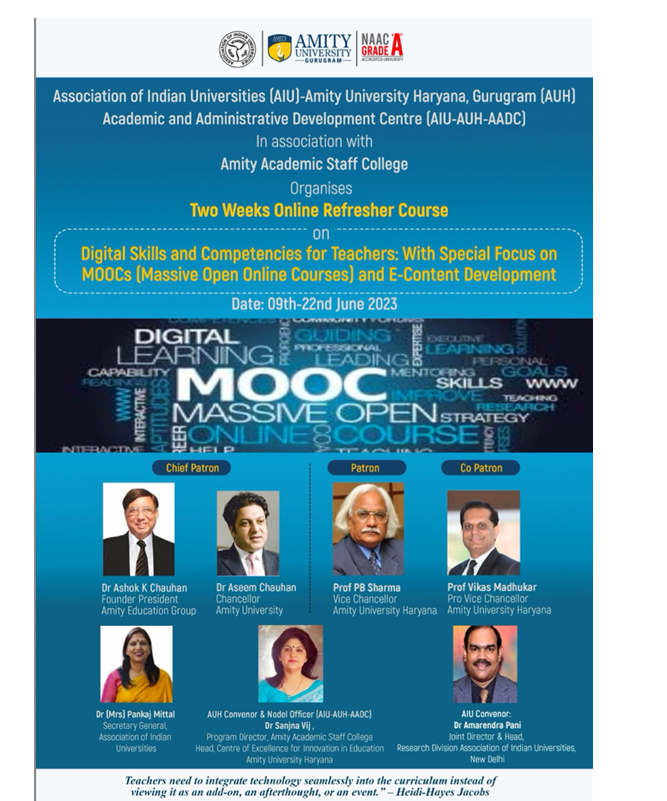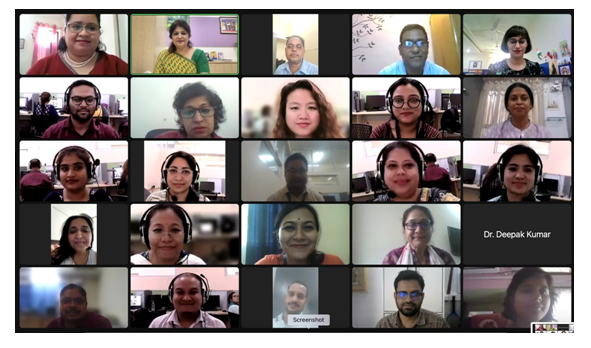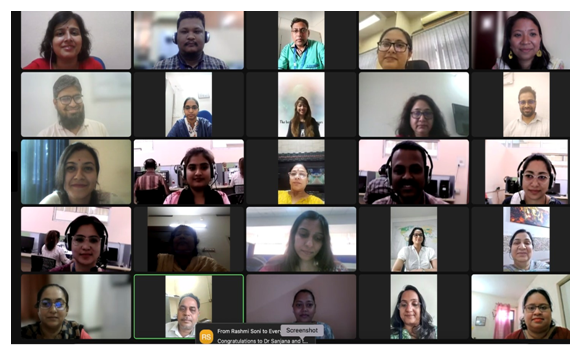29, Jun 2023
New Age Universities should Foster New Age Learning Environment -Experts at Amity University Haryana
Atwo-week online refresher course on Digital Skills and Competencies for University Teachers: With a Special Focus on MOOC’s and E-Content Development jointly organized by Amity University Haryana and Association of Indian Universities, Academic and Administrative Development Centre in collaboration with Academic Staff College, Amity University Haryana to equip teachers with the 21st-century digital skills necessary to design, develop, and deliver MOOCs effectively so that they should be at par with national and international standards and have the ability to think critically and creatively, to collaborate with others, to clearly and effectively communicate with students. The program was held successfully from June 09-22, 2023.

The course attracted a significant number of registered participants, including deans, heads of institutions, faculty members, and a total of 146 participants from various universities, institutes, and colleges in both India and abroad
The program commenced with opening remarks by Prof Sanjna Vij, Deputy Director, Academic Staff College, Amity University Haryana and Chief organiser of the Program. In her remarks, Prof Sanjna Vij emphasized that in today’s rapidly changing world, digital skills have become essential in our daily lives. As educators, it is crucial for teachers to stay updated and equipped with the necessary tools and competencies to effectively navigate digital landscapes. Highlighting the importance of embracing digital skills, Prof Vij quoted, “Illiterates of the 21st century will not be those who cannot read and write, but those who cannot learn, unlearn, and relearn.” This quote serves as a reminder to teachers that embracing digital skills and technology is not a one-time effort but an ongoing process of learning, unlearning outdated practices, and relearning new ones.

Delivering the Keynote address, Prof. P.B. Sharma, Hon’ble Vice Chancellor, Amity University Haryana, emphasized on creating a new age learning environment within Indian universities. Prof Sharma highlighted the significance of events like this and stressed the need for utmost seriousness. Prof Sharma stated that such gatherings signify the eagerness and determination of the teaching community to prepare for the challenges ahead, particularly in the digital age. In this new age, it is crucial to actively contribute towards establishing an educational environment that maximizes the potential of digital tools and technologies in the realm of teaching and learning. Prof. Sharma underlined the need for teachers to foster an environment that supports three key attributes: innovation, collaboration, and enterprising approach. By embracing these attributes, teachers can create a dynamic and effective learning environment that prepares students for the challenges of the digital age. Prof Sharma also stated the importance of generating new applied knowledge and expressed delight in having esteemed resource persons present during the course
The Chief Guest, Prof. S.N. Sridhara, Hon’ble Vice Chancellor, Hindustan Institute of Technology and Science, Chennai in his presentation titled “Revolutionising Education: The MOOCs,” provided a comprehensive overview of MOOCs. Prof Sridhara delved into the history of MOOCs, distinguishing between cMOOCs and xMOOCs. Furthermore, he discussed the development of MOOC companies in the United States, such as Udacity, Coursera, and edX, as well as those in Asia, including SWAYAM, NPTEL, and JMOOC, and Europe’s FutureLearn, EduOPen, and MOOC.fi.Prof. S.N. Sridhara also highlighted the success story of SWAYAM MOOCs and elucidated the requirements for creating MOOCs. He elaborated on the four quadrants of LMS, which encompassed aspects such as synchronous and asynchronous engagement, E-content, AI-assisted assessment, and peer learning. Additionally, he addressed the issue of attrition in MOOCs and provided insights into the underlying reasons for it.

Prof Vikas Madhukar, Pro-Vice Chancellor, AUH during his address emphasized the need for modern educators to stay aligned with new technological advancements. Prof Madhukar mentioned the importance of incorporating the National Education Policy (NEP) into the academic curriculum. The NEP places particular emphasis on the SWAYAM MOOCs platform, which was created by the All India Council for Technical Education (AICTE) in 2016. This platform provides Massive Open Online Courses (MOOCs) that can benefit both teachers and students by offering flexible and accessible learning opportunities. By incorporating the NEP and leveraging platforms like SWAYAM, educators can enhance their digital skills and competencies, as well as develop e-content that aligns with the changing educational landscape. Prof. Madhukar emphasized that by embracing these technologies and platforms, educators can create engaging learning experiences and cater to the diverse needs of students in the digital age.
Dr. B. Shadrach, Director, Commonwealth Educational Media Centre for Asia, Commonwealth of Learning, New Delhi, emphasized the significance of understanding the learners and their individual learning styles for educators. During the presentation, Dr. Shadrach discussed the importance of teachers understanding the theoretical grounding of their teaching practices as well as their practical orientation. By having a strong theoretical foundation, teachers can design and deliver effective digital learning experiences for their students. Additionally, understanding the practical aspects of teaching allows teachers to align their digital skills and competencies with the needs of their students.
Dr.BrijuThankachan, Executive Director, Educational Technology Society of India& Ex-Visiting Faculty, Educational Technology, IIT Bombay touched upon the paradigm shift in the education system and introduced the concept of the information age paradigm, which highlights the changing role of teachers from being mere information providers to becoming facilitators of information. Dr.Thankachanalso emphasized that in the information age, teachers are no longer the sole repositories of knowledge. Instead, they play a crucial role in guiding students in accessing and critically analysing information. The focus has shifted towards developing skills such as digital literacy, information evaluation, and problem-solving.
Dr.AmrendraPani, Joint Director & Head, Research Division, Association of Indian Universities, Delhi during his address emphasized the importance of AIU’s objective to modernize digital education through the introduction of online activities for teachers, such as teaching, learning, and integrating technology into the research and revolution process of teaching and learning.
During the two-week event, excellent and fruitful deliberations were shared by esteemed speakers from various domains included – Jake Olivier, Adviser: Higher Education at the Commonwealth of Learning, Burnaby, Canada, Dr. Fawzi Baroud, Chairholder, UNESCO Chair on Open Educational Resources (OER) for Access and Success, Assistant Vice President for Information Technology, Notre Dame University -Louaize (NDU), Lebanon, Dr Md Shuhel Miah, Deputy Dean, Brittany University, Malaysia, Prof. Uma Kanjilal, Pro-Vice Chancellor, IGNOU, Prof Sameer Sahasrabudhe, Professor of Practice (Design), IIT Gandhinagar, Prof B.S. Balaji, School of Biotechnology, Jawaharlal Nehru University, New Delhi, Prof Ramesh C. Sharma, Associate Professor, School of Global Affairs, Director, Human Resource Development Centre, Dr B.R. Ambedkar University, Delhi, Ms. Subha Das Mollick, Independent filmmaker, visiting faculty Aliah University and Maulana Abul Kalam Azad University of Technology, Prof Manas Ranjan Panigrahi, Director, Symbiosis Centre for Online Learning (SCOL), Symbiosis Skills and Professional University, Pune, Prof. Kushal Sen, Indian Institute of Technology Department of Textile Technology Hauz Khas, New Delhi and many more esteemed speakers during the event contribute to the overall objectives of the NEP-2020, fostering a culture of lifelong learning, professional growth, and effective pedagogy among teachers.
Overall, the two weeks of the refresher course were filled with a wealth of information, wisdom, fresh perspectives, and cherished memories.
Maj Gen (Dr) J.S.Dhull, VSM (Retd), Director, Amity Institute of Defence Technology & Deputy Director, ASET, AUH delivered Vote of Thanksexpressing gratitude to all the dignitaries, organisers, and participants.
- 0
- By Neel Achary







